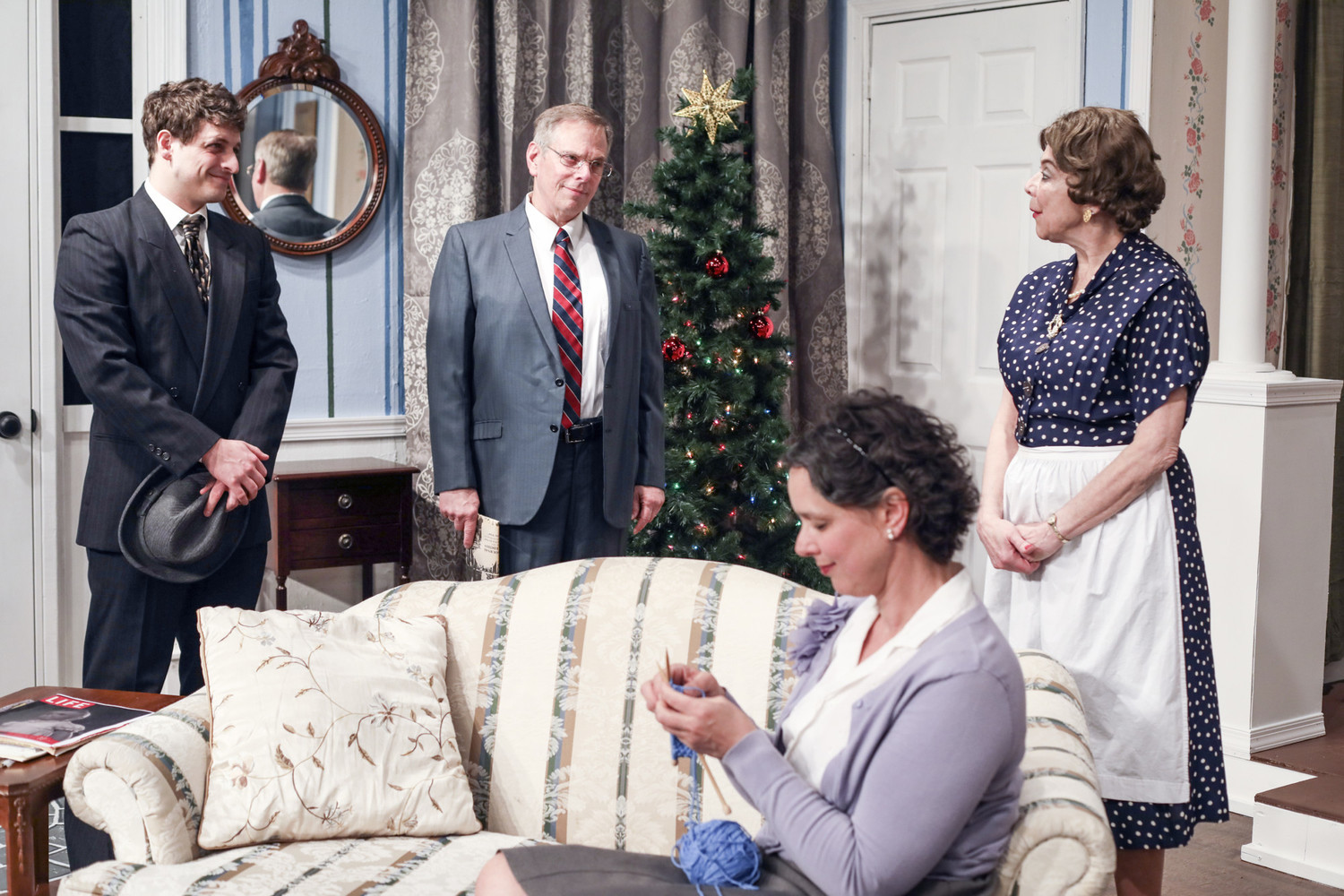Review: THE LAST NIGHT OF BALLYHOO at Oyster Mill Playhouse

The Last Night of Ballyhoo was first performed at Atlanta's Alliance Theatre and found its way to the Broadway stage in 1997 at the Helen Hayes Theatre. Written by Alfred Uhry, The Last Night of Ballyhoo takes place in 1939 in the home of Adolph Freitag in Atlanta, Georgia. The play explores themes of identity, prejudice, and inter-Jewish racism through the lives of Adolph and his sister Beulah "Boo" Levy, their sister-in-law Reba Freitag, cousins Lala Levy (Beulah's daughter) and Sunny Freitag (Reba's daughter), and two young men-Joe Farkas from New York and Peachy Weil of the Louisana Weils. Oyster Mill Playhouse takes on this deep yet humorous play through May 12th.
One of the aspects of this show that most stands out is how the play comes together aesthetically. The set and props are realistic, giving the audience the sense of truly being in the Freitag living room. The background music evokes just the right sense of nostalgia, framing each scene perfectly and making the scene changes seem like they took no time at all. The costumes were clearly selected carefully to complete the picture.
The talent on stage matches the aesthetic appeal of the play as well. When the lights come up on Lala Levy (played by Rebecca Lease) and Reba Freitag (played by KeriAn Cross), the audience immediately gets a sense for who these women are even before they start to speak.
Lease carries off the part of Lala beautifully, with the hopeful naiveté of a dreamer. Her character's obsession with Gone with the Wind is humorous and not over-played. Lease's interactions with her fellow castmates are what really bring her character to life. The frustration she displays toward her mother (Beulah, played by Anne Marino) is relatable, as is her awkward flirtatiousness with Joe (played by Dakota Eschenmann) and Peachy (portrayed by Jacob Tingstrom). One of her best scenes, though is the fight Lala has with Sunny at the end of Act 1. Both actors are fully engaged in the scene, and it's entrancing for the audience.
KeriAn Cross, a newcomer to Oyster Mill, is endearing as the sweet Reba Freitag. This character provides some comic relief, and Cross does a great job at making the role funny without it seeming forced. Her expression, body language, and tone of voice maintain an air of innocence and southern charm throughout the performance. Next to her overbearing sister-in-law Beulah, Reba is a breath of fresh air, and Cross is just right for the part.
Beulah "Boo" Levy is a force to be reckoned with, and Anne Marino brings this character to life with seeming ease. Marino has wonderful stage presence and uses every movement and expression to help the audience feel what her character is feeling. Marino interacts well with her fellow cast members, particularly in her scenes with Lease's Lala. The mother-daughter relationship is well developed, and Marino and Lease perform it beautifully in all of its frustration, dysfunction, and love.
Gordon Einhorn portrays Adolph Freitag. Adolph is the opposite of his sister Beulah, and Einhorn infuses the role with just the right amount of resignation and dry humor to lend authenticity to this character who is surrounded by women. It is a beautiful moment when the audience finally sees some real emotion from the character in Adolph's fight with Beulah. Einhorn's portrayal of Adolph as a mild-mannered businessman makes this scene really pop, as his frustration with Beulah finally comes to the fore.
The final member of the family is Sunny Freitag. This role is played by Caitlyn Davis. Just as Adolph and Reba are very different from Beulah, Sunny provides a contrast to Lala. When we first meet Sunny on the train, the audience gets the feeling that she is practical, capable, intelligent, and not often given to fancy. Davis handles this role quite well, truly seeming like a Wellesley girl. Davis particularly shines in her scenes with Dakota Eschenmann's Joe Farkas. They have great chemistry on stage, and they perform one of the most difficult scenes in the show-about Jewish identity-beautifully.
Eschenmann is the quintessential Joe Farkas. From his accent to his mannerisms, he is extremely convincing as the Jewish New Yorker struggling with his identity in Atlanta. The difference in how he reacts to Lala and Sunny is humorous, and the shy flirtation he engages in with Sunny is charming. Eschenmann really shines in the second act in his argument with Sunny and in the scene where they reconcile.
Peachy Weil is portrayed by Jacob Tingstrom. Weil is a brash, blunt, egotistical young man who doesn't always know when to keep his mouth shut. Tingstrom manages to play this role without making the character obnoxious. The scene at Ballyhoo when Peachy marvels at the fact that women go to the bathroom in groups is hysterical and well played, and his interactions with Lease's Lala are similarly funny but in a cute way.
The cast and crew at Oyster Mill Playhouse put together a well-paced, cohesive, thought-provoking, and entertaining performance of The Last Night of Ballyhoo.
You have two more chances to see this great show at Oyster Mill Playhouse, so get your tickets at www.oystermill.com before it's too late!
Reader Reviews
Videos

